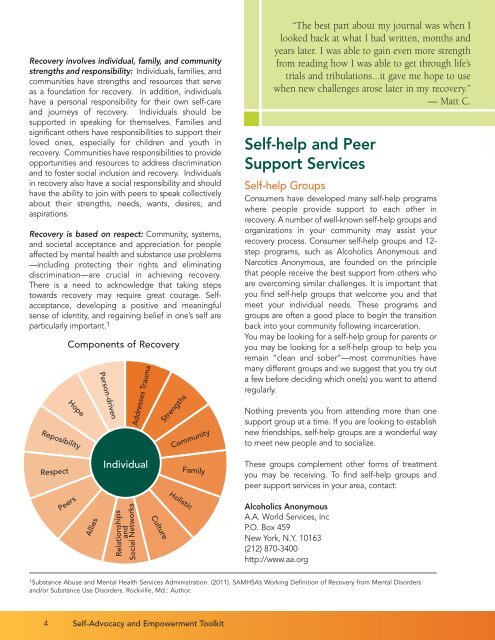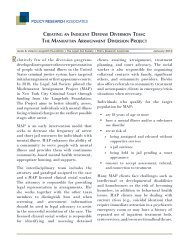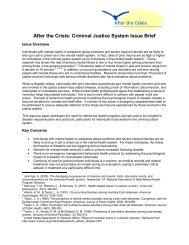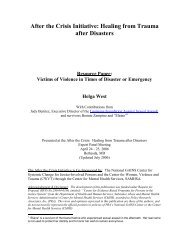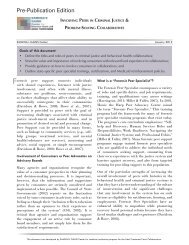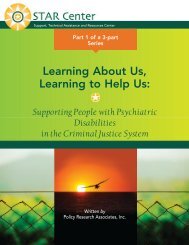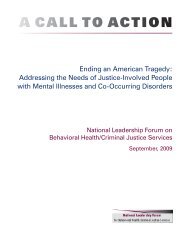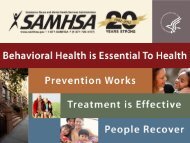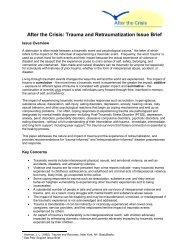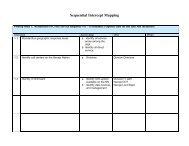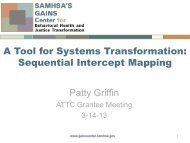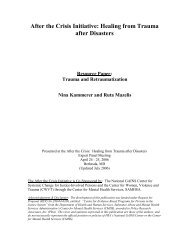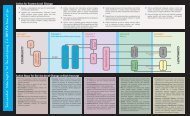Self-Advocacy and Empowerment Toolkit - STAR Center
Self-Advocacy and Empowerment Toolkit - STAR Center
Self-Advocacy and Empowerment Toolkit - STAR Center
You also want an ePaper? Increase the reach of your titles
YUMPU automatically turns print PDFs into web optimized ePapers that Google loves.
Recovery involves individual, family, <strong>and</strong> community<br />
strengths <strong>and</strong> responsibility: Individuals, families, <strong>and</strong><br />
communities have strengths <strong>and</strong> resources that serve<br />
as a foundation for recovery. In addition, individuals<br />
have a personal responsibility for their own self-care<br />
<strong>and</strong> journeys of recovery. Individuals should be<br />
supported in speaking for themselves. Families <strong>and</strong><br />
significant others have responsibilities to support their<br />
loved ones, especially for children <strong>and</strong> youth in<br />
recovery. Communities have responsibilities to provide<br />
opportunities <strong>and</strong> resources to address discrimination<br />
<strong>and</strong> to foster social inclusion <strong>and</strong> recovery. Individuals<br />
in recovery also have a social responsibility <strong>and</strong> should<br />
have the ability to join with peers to speak collectively<br />
about their strengths, needs, wants, desires, <strong>and</strong><br />
aspirations.<br />
Recovery is based on respect: Community, systems,<br />
<strong>and</strong> societal acceptance <strong>and</strong> appreciation for people<br />
affected by mental health <strong>and</strong> substance use problems<br />
—including protecting their rights <strong>and</strong> eliminating<br />
discrimination—are crucial in achieving recovery.<br />
There is a need to acknowledge that taking steps<br />
towards recovery may require great courage. <strong>Self</strong>acceptance,<br />
developing a positive <strong>and</strong> meaningful<br />
sense of identity, <strong>and</strong> regaining belief in one’s self are<br />
particularly important. 1<br />
Hope<br />
Reposibility<br />
Components of Recovery<br />
Person-driven<br />
Addresses Trauma<br />
Strengths<br />
Community<br />
“The best part about my journal was when I<br />
looked back at what I had written, months <strong>and</strong><br />
years later. I was able to gain even more strength<br />
from reading how I was able to get through life’s<br />
trials <strong>and</strong> tribulations...it gave me hope to use<br />
when new challenges arose later in my recovery.”<br />
— Matt C.<br />
<strong>Self</strong>-help <strong>and</strong> Peer<br />
Support Services<br />
<strong>Self</strong>-help Groups<br />
Consumers have developed many self-help programs<br />
where people provide support to each other in<br />
recovery. A number of well-known self-help groups <strong>and</strong><br />
organizations in your community may assist your<br />
recovery process. Consumer self-help groups <strong>and</strong> 12-<br />
step programs, such as Alcoholics Anonymous <strong>and</strong><br />
Narcotics Anonymous, are founded on the principle<br />
that people receive the best support from others who<br />
are overcoming similar challenges. It is important that<br />
you find self-help groups that welcome you <strong>and</strong> that<br />
meet your individual needs. These programs <strong>and</strong><br />
groups are often a good place to begin the transition<br />
back into your community following incarceration.<br />
You may be looking for a self-help group for parents or<br />
you may be looking for a self-help group to help you<br />
remain “clean <strong>and</strong> sober”—most communities have<br />
many different groups <strong>and</strong> we suggest that you try out<br />
a few before deciding which one(s) you want to attend<br />
regularly.<br />
Nothing prevents you from attending more than one<br />
support group at a time. If you are looking to establish<br />
new friendships, self-help groups are a wonderful way<br />
to meet new people <strong>and</strong> to socialize.<br />
Respect<br />
Individual<br />
Family<br />
These groups complement other forms of treatment<br />
you may be receiving. To find self-help groups <strong>and</strong><br />
peer support services in your area, contact:<br />
Peers<br />
Allies<br />
Relationships<br />
<strong>and</strong><br />
Social Networks<br />
Culture<br />
Holistic<br />
Alcoholics Anonymous<br />
A.A. World Services, Inc<br />
P.O. Box 459<br />
New York, N.Y. 10163<br />
(212) 870-3400<br />
http://www.aa.org<br />
1Substance Abuse <strong>and</strong> Mental Health Services Administration. (2011). SAMHSA’s Working Definition of Recovery from Mental Disorders<br />
<strong>and</strong>/or Substance Use Disorders. Rockville, Md.: Author.<br />
4 <strong>Self</strong>-<strong>Advocacy</strong> <strong>and</strong> <strong>Empowerment</strong> <strong>Toolkit</strong>


